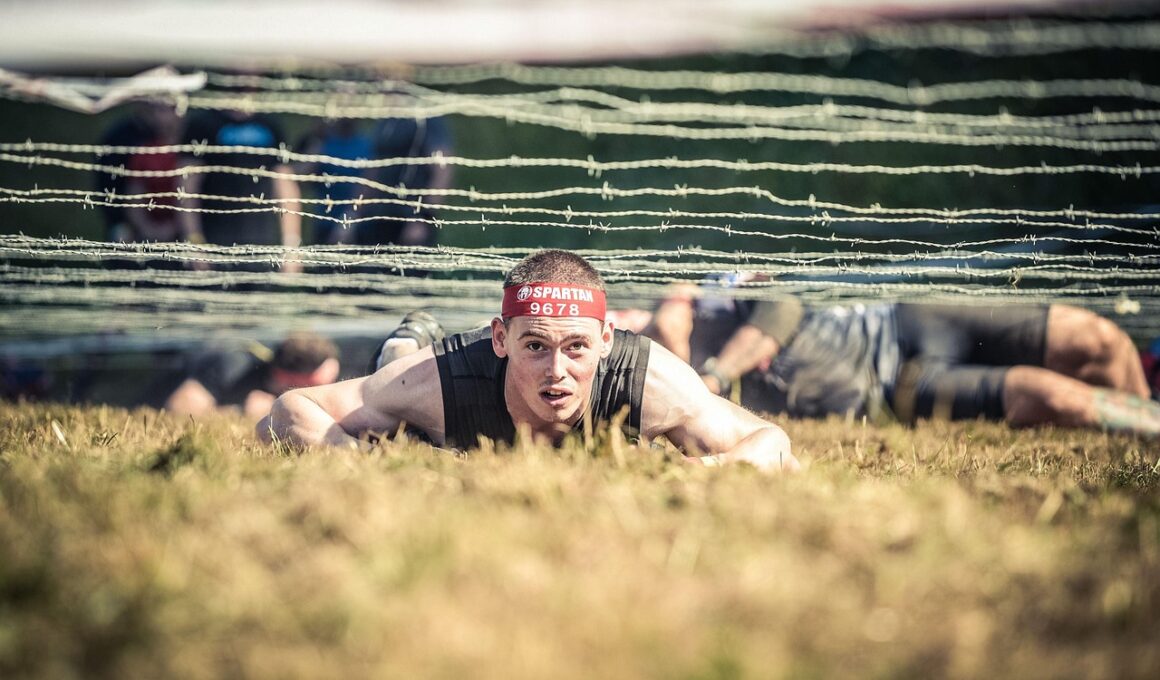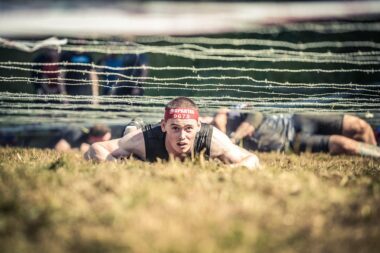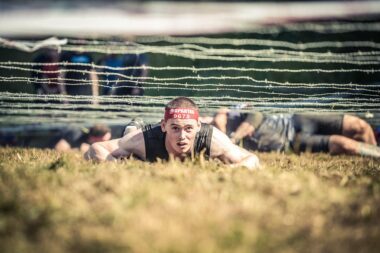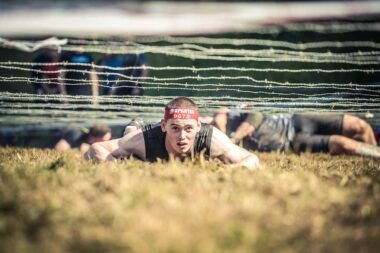Developing Mental Toughness for Obstacle Course Racing Success
For any athlete involved in Obstacle Course Racing (OCR), mental toughness is a vital component of their overall performance. To conquer physically demanding courses, athletes must prepare not only their bodies but also their minds. Mental resilience can mean the difference between succumbing to fatigue and pushing through to victory. OCR is unique due to its unpredictable nature and mental barriers, often demanding a warrior spirit. The practice of visualization can profoundly enhance performance by enabling athletes to mentally rehearse challenges before facing them physically. The process of imagining one’s success, traversing the course, and overcoming obstacles leads to increased confidence. Support systems are equally important; they provide motivation through the camaraderie found in team training or the encouragement from friends. Additionally, taking on smaller challenges that simulate race-day conditions helps build this mental toughness over time. Understanding that setbacks are part of the journey keeps athletes prepared mentally. Establishing a strong mindset allows athletes to embrace discomfort and uncertainty while competing. Altogether, developing mental resilience makes a noticeable impact in achieving milestones in OCR events, fostering a winning spirit essential for success.
Another crucial element of mental toughness is the cultivation of a ‘growth mindset.’ This philosophy encourages athletes to view their failures not as insurmountable obstacles but as valuable learning experiences. By analyzing these setbacks, OCR participants can identify areas for improvement and refine their skills. Journaling can be an effective tool in this process; tracking progress encourages self-reflection and allows athletes to see how far they have come. Goal-setting, both in short and long terms, provides motivation. When these goals are chased with determination, they instill a sense of purpose, pushing athletes to train harder in anticipation of race day. Moreover, surrounding oneself with positive influences is paramount. Engaging with fellow athletes or coaches who exhibit a strong mindset can inspire others to adopt similar attributes. Consistent exposure to such an environment nurtures resilience. Balancing both training and recovery is essential too; it prevents burnout, enabling athletes to approach each session and race with a refreshed perspective. This way, the emphasis shifts from merely finishing a race to genuinely enjoying the process of competing and improving continuously, making each event a stepping stone towards greater achievements.
The Role of Mental Strategies in OCR
Utilizing mental strategies during competition can significantly enhance performance levels for OCR athletes. Implementing techniques such as positive affirmations helps combat negative thoughts under pressure. Repeating phrases like “I am strong” or “I can do this” boosts self-belief and concentrates focus on achieving specific goals. Many athletes also find that developing pre-race routines helps calm their nerves. These rituals can create a sense of comfort and familiarization, forming a mental anchor that helps athletes remember that they have prepared adequately. Additionally, techniques such as breathing exercises are beneficial; they enable athletes to control anxiety and regulate their physical responses during races. When participants engage in breath regulation, it can enhance stamina and stress management under duress. Practicing these techniques during training equips athletes with the skills needed to maintain composure in high-pressure situations and manage unpredictable course challenges effectively. Furthermore, learning to focus solely on the moment can drastically improve performance, as it reduces distractions and keeps athletes attuned to their physical capabilities. Through effective mental preparation and strategies, athletes can sharpen their focus and maximize their performance potential.
A critical part of mental toughness also lies in fostering perseverance. During brutal courses, athletes will inevitably face fatigue and find themselves questioning their abilities. Resilience allows athletes to maintain their motivation despite physical discomfort. Training should incorporate simulations of race conditions where fatigue is intentionally introduced, such as during obstacle repetitions or endurance runs. This builds both physical and mental stamina, preparing athletes for the trials they will face on the course. The importance of recovery and proper rest must not be overlooked. Recovery techniques such as active rest, stretching, and sleep are essential for mental clarity and preventing burnout. It is during these rest periods that the mind can recuperate from pressures, reflecting on achievements and challenges faced. Furthermore, establishing a support network helps athletes push through the tough moments, creating an environment of accountability. Sharing ambitions and achievements keeps individual athletes motivated to train harder. Recognizing collective efforts, along with personal growth, fosters a greater appreciation for the sport. Developing perseverance, bolstered by a supportive community, equips OCR athletes with the tools needed to conquer tough courses and challenges.
Embracing Challenges in OCR Training
OCR athletes learn that embracing challenges can lead to outstanding mental toughness development. Every obstacle presented during training serves as an opportunity for growth, pushing competitors to step outside their comfort zones. Whether it’s climbing walls, crawling under barbed wire, or traversing muddy terrain, each challenge requires athletes to mentally prepare themselves before tackling them physically. The anticipation of discomfort is crucial; this forethought allows racers to adopt a mindset ready for struggle. Training regimens should introduce variability to replicate race conditions better. Varying the environments under which athletes train, such as shifting surfaces and weather conditions, proves beneficial in preparing for race day. These unpredictable elements often contribute to mental fortitude when they arise during competition. Additionally, testing the limits of endurance helps athletes to gauge their capabilities, setting realistic expectations. Tracking progress from these tough sessions fosters satisfaction and encourages continuous effort toward improvement. From understanding stages of fatigue to mastering emotional responses during adverse conditions, every aspect contributes to developing mental resilience essential for OCR success. By reframing challenges as opportunities, athletes build a foundation for both personal and athletic growth.
Moreover, building a routine that integrates visualization techniques can boost confidence before critical events. When athletes consistently visualize successful performances, they positively reinforce mental toughness, preparing themselves to confront real-life challenges. It’s essential to create clear mental imagery depicting the pathways of obstacles during training, leading to bursts of motivation. Visualization not only sharpens existing skills but also helps in mentally rehearsing what needs to be done, reducing anxiety when performing in actual competitions. Implementing a consistent mindfulness practice can complement visualization efforts, allowing OCR athletes to cultivate focus. Mindfulness techniques, such as meditation or breathing exercises, help stabilize emotional responses, which can be invaluable in high-stress situations. Creating a well-rounded mental toolkit rich with supportive techniques enhances competitive advantages during races. Traditional methods decrease anxiety and increase concentration levels, while mindfulness fosters a deeper connection to the physical realities of racing. Committing to developing such a practice leads to an enhanced holistic approach for athletes in OCR. By fostering and integrating both visualization and mindfulness, athletes significantly improve their mental maturity, leading to higher success levels on race day.
Conclusion: The Path to OCR Mastery
Ultimately, developing mental toughness in Obstacle Course Racing is a multifaceted journey that combines various strategies. From setting realistic goals, fostering a growth mindset, embracing challenges, to utilizing mental strategies, each aspect plays a unique role in an athlete’s success. Building a robust support network further enriches this journey, providing comfort and encouragement as athletes navigate their paths. Committing to consistency during training ensures that athletes are well-prepared for the obstacles before them. Recognizing the value in rest and recovery reinforces the understanding that mental clarity is essential for high-performance results. Moreover, consistently engaging with techniques like visualization and mindfulness cultivates a deeper connection to each athlete’s pursuits, enhancing their experiences and growth. At the end of the day, determination, resilience, and a positive mindset are key ingredients to conquering any OCR course. So, OCR athletes must embrace this mental journey, knowing that every challenge faced is an opportunity to grow and become more than just an athlete; they evolve into champions. As they develop mental toughness, they unlock the potential for greatness in every race.
This comprehensive understanding of the mental aspect in OCR prepares athletes for success. With each hurdle overcome, reinforcing mental toughness boosts self-esteem and inspires athletes to continue pushing their limits. This ongoing evolution does not merely produce better racers; it cultivates individuals capable of facing life’s obstacles with grace and strength. As athletes discover their own potential during rigorous training and competition, they become empowered, instilling a belief in their ability to conquer any challenge life tosses their way. In doing so, they elevate not just their racing performance but also their personal journeys, creating an inspiring narrative of triumph against adversity. The lessons learned in OCR transcend into daily life; these athletes can face stress, setbacks, and emotional challenges with renewed vigor. Encouraging mental toughness creates well-rounded individuals prepared for varied life experiences. Therefore, as OCR continues to grow, so too will the emphasis on developing mental strength alongside physical capabilities. This dual focus ensures that athletes are not only successful in racing but emerge as resilient, determined individuals prepared to tackle various obstacles both on and off the course. Ultimately, the journey is about more than just racing—it’s about thriving.





